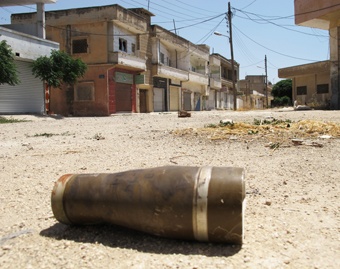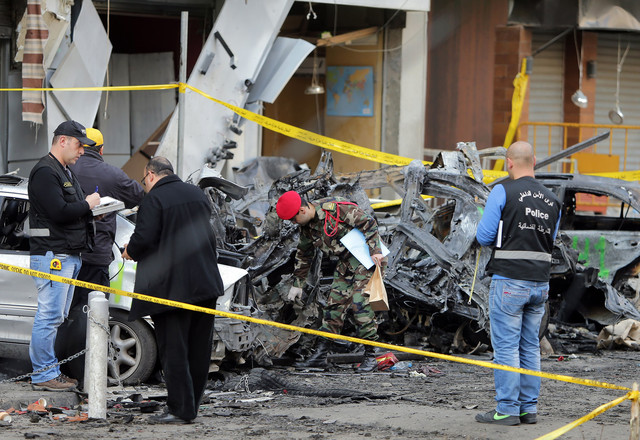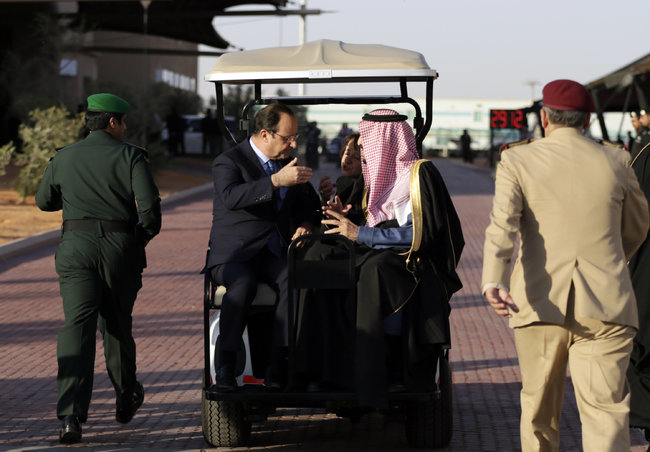General Security chief Maj. Gen. Abbas Ibrahim on Monday said that officers from his directorate met with representatives of the kidnappers of the Maalula nuns, in the presence of a Qatari delegation, as part of efforts to release the abducted women. In an interview with An Nahar newspaper, of which excerpts were published […]
On Thursday, nearly nine years after a bomb killed former Prime Minister Rafiq Hariri and 21 others, four men accused of taking part in the assassination will be tried in absentia by an international court created in 2009 for that very purpose. NOW offers a guide about what to expect from the opening of the […]
Lebanese woman Rima Najdi has come up with a unique way to protest the recent deadly bombings that have rocked Lebanon. She wrapped herself in a hoax suicide vest and roamed several Beirut streets on Sunday. The woman "wore a vest carrying fake sticks of TNT and wandered in Beirut’s streets on Sunday," the pan-Arab daily […]
BEIRUT – Lebanese President Michel Suleiman on Friday said that the country’s political parties have ten days to reach a consensus on a unity cabinet, or he will move ahead with green-lighting a fait accompli cabinet. “If there is no agreement on an all-inclusive government within 10 days, there will be a new cabinet,” he […]
Admired by some and reviled by others, former Israeli Prime Minister Ariel Sharon bears a complicated legacy. Sharon, 85, died Saturday after spending eight years in a coma brought on by a massive stroke in 2006. A controversial figure in Middle East politics, Sharon earned several nicknames among Israelis and Palestinians during his decades-long military and […]

.- Nearly twice the number of Christians were reported as dying for their faith in 2013 than the previous year, according to a new study by an organization monitoring global religious persecution. The World Watch List, issued by Open Doors USA each year, documents oppression of Christians throughout the world. Based on data from the past year, it ranks the 50 countries that are home to the worst treatment of Christians.
Along with the release of the 2014 report, Open Doors USA also offered information about global Christian persecution on its website, explaining that it had gathered evidence of 2,123 Christians who were killed for their faith in 2013, up from 1,201 such martyrdoms in 2012. “This is a very minimal count based on what has been reported in the media and we can confirm,” said Frans Veerman, head of research for the organization, according to Reuters. He explained that the actual numbers could be much higher. The Open Doors USA report estimated that around 100 million Christians were persecuted for their faith in 2013. North Korea, which ranked as the worst offender on the 2013 World Watch List, remains the most dangerous country for Christians in 2014 as well, solely because of the national government’s targeting of religious believers.

bloomberg: Donna Abu-Nasr : When Omar Jabaly plans an outing in Beirut these days his main concern is finding the least likely place to be targeted by car bombers.
“A sidewalk cafe is more risky than a mall,” said Jabaly, 39, an engineer for a local telecommunications company in the Lebanese capital. “There’s security at mall entrances while a suicide bomber can blow himself up in front of a cafe.” The wave of car explosions started in July with a suicide bombing in Hezbollah’s south Beirut stronghold and spread across Sunni and Shiite Muslim communities as Lebanon gets mired even deeper in the sectarian nature of the Syrian conflict next door. The attacks intensified in recent weeks, with one that killed former Finance Minister Mohamad Chatah, a senior Sunni Muslim figure, in December followed by another in a Shiite area of the capital that left at least five people dead last week.
Security will only deteriorate further as long as the almost three-year-old Syrian civil war lasts, said Hassan Mneimmneh, senior fellow at the Washington-based German Marshall Fund of the United States, a research organization. “We have ahead of us many years of serious difficulties,” Mneimmneh said. “Lebanon has become part and parcel of the Syrian conflict. It’s an open field for any action against a Lebanese party, such as Hezbollah, or, for the passing of a message from one security service to another.”
A series of bombings have rocked Beirut in the past couple of weeks, killing dozens and injuring many more, and now sparking an online campaign, #NotAMartyr, that encourages people to voice their frustrations with the ongoing violence. The latest explosion comes just days after the car bomb attack that killed Lebanon’s former Finance […]
TRIPOLI, Lebanon – It took Father Ibrahim Surouj around half an hour to enter his bookstore on Tuesday morning. The recent fire didn’t prevent his entry. The stream of well-wishers did. “Abouna! [Our father],” person after person shouted upon seeing Surouj as he walked down a narrow street and turned into an even narrower alleyway toward […]

By ANNE BARNARD, New York Times.
BEIRUT, Lebanon — If a wealthy patron were all the Lebanese Army needed to counter the Shiite militant group Hezbollah as the dominant force in the country, the recent $3 billion grant from Saudi Arabia might make a decisive difference in the country’s complex political landscape.
But the Saudi aid package — nearly twice Lebanon’s $1.7 billion annual defense budget — is earmarked to buy French arms and is unlikely to give the army what it needs most, say supporters and opponents of Hezbollah here. And even if it does, they say, it will take years to make an impact.
And while the Saudis are clearly alarmed at Hezbollah’s staying power and its intervention in Syria’s civil war, analysts say the gift announced last week was intended as much to send a message to the United States as to shift the military balance.
Yezid Sayigh, a scholar of Arab militaries at the Carnegie Middle East Center in Beirut, said the Saudis were declaring a “tactical divorce” from the Obama administration over their frustrations with what they see as America’s indecisiveness on Syria and its attempts at reconciliation with Iran, Saudi Arabia’s regional rival and Hezbollah’s patron.
“They’re on the warpath, angry, and that doesn’t make for good policy,” Mr. Sayigh said.
Analysts on both sides agree that if Lebanon’s government, under Saudi pressure, pushed the army to confront Hezbollah, it would risk fracturing the force along political and sectarian lines and destroying the closest thing the country has to a broad-based national institution. Mr. Sayigh said that not even the United States had tried to link aid to Lebanon’s army with action against Hezbollah.



